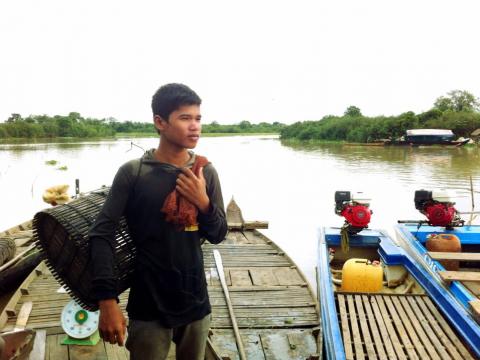From School Boy to Fisher Boy

One month is not very long in a boy’s life, but for a boy who is alone at night on the Tonle Sap River, the largest river in South East Asia, it feels like an eternity. This is the story of Sorn Kimsey, a boy who sacrificed his study to start fishing in order to earn additional income for his family.
Born in a village where most of the residents are fishermen, Kimsey’s parents still managed to send him to school, until grade 7. Things changed however, after his mother had a serious accident.
“My mother’s leg was broken and she could not go fishing anymore. Therefore, I had to do the fishing instead of her to support our daily expenses," says 16 years old Kimsey, adding that he and his father try to earn more income to pay back family loans.
Instead of going to school like other kids his age, Kimsey embarks on fishing trips that keep him away from home for a month at a time. His journey to the fishing area is a difficult one.
Slouched in his brown t-shirt, Kimsey describes that he and other villagers have to get on a tractor in the morning and travel about six kilometres to a ferry port. Once there, he jumps on his small rickety wooden boat, which is made from palm trees. Using both hands and rowing with his paddle, the boat moves slowly along a narrow waterway surrounded by a flooded forest and the sounds of different singing birds. It is probably his only chance to enjoy the trip before arriving at his fishing destination later that evening.
“I am always reminded of the time when I went to school, the time when I walked to school happily with my friends.”
“It takes me a whole day to get to the fishing area. Every evening, after I come back from fishing, I park my boat near the land, find four wooden poles and attach it vertically to the boat before applying plastic bags on it as the shelter at night,” says Kimsey.
When asked about his activities on the boat alone at night, Kimsey says he always listens to the radio and practices his writing by jotting down the lyrics of the songs. Trying not to forget what he learned in school.
“When I was studying, I loved reading books. Now, I try to write the lyrics when I’m here” pausing in sadness he continues, “I am always reminded of the time when I went to school, the time when I walked to school happily with my friends.”
Prom Thornin, one of World Vision’s Transformational Development Facilitators who lives and works with the communities, says people who live along the fishing area are vulnerable to diseases caused by mosquitoes or from using unclean water.
“If people in the area are sick, there is no health centre nearby that can provide services to them. They use muddy water and put some alum (chemical compound, traditionally used to purify water) before drinking,” says Mr. Prom, adding that young fisherman like Kimsey are vulnerable to snake bites in the flooded forest.
In addition to the threats from nature, lack of advanced fishing techniques also affects his earning potential. With his little fishing equipment, Kimsey's catch is limited to about 2 kilograms per day. Those fish earn him 10,000 Riels ($2.5 USD).
“In 10 days, I can earn 100,000 Riels ($25 USD). However, if there is storm or heavy rain, I cannot go fishing and I earn nothing” he says.
Storms do not give much warning of their arrival. Sometimes, Kimsey gets caught in the middle of these storms, and sometimes he is even able to consider them as an adventure.
“As I was fishing in the river one day, there was a sudden storm, which caused big waves. Seeing this, I had to quickly move my boat to a tree nearby; otherwise, the waves would hit my boat and cause it to collapse,” he says.
Kimsey’s mother, Sieng Hon, says that she feels pity for her child who quit school to earn money just because of her accident. If their living situation was better, she says she would send Kimsey back to school.
“All of my children, including Kimsey, perform well in the class. So, I do not want them to lack education like me,” she says.
Even though his hand is carrying fishing equipment instead of pens and pencils, Kimsey says “I wish I could go back to school because only school can provide me the knowledge I need for a better future”.